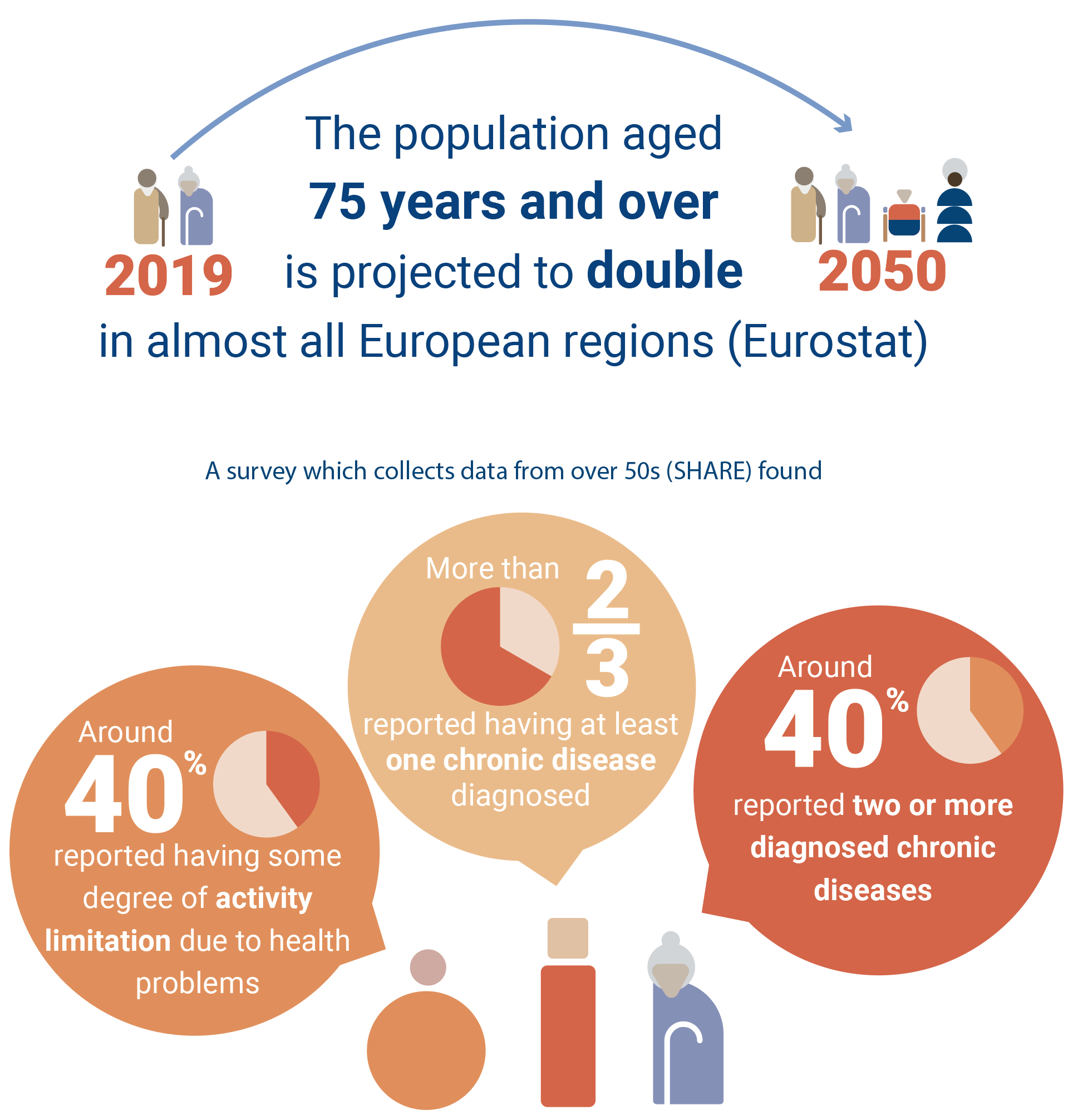WELLBEING – IMPORTANT AT EVERY LIFE STAGE
Since the pandemic, wellbeing has been a more common topic of conversation and we all think we know what this term means, but what does it require to have true wellbeing and why is this important to us as we age?
What is wellbeing?
We might think about wellbeing as just being the absence of illness, but it is about so much more than physical health. Wellbeing is a complex concept and therefore there is no single definition. It is difficult to define as it covers both objective and subjective factors, however, it is generally agreed that wellbeing requires meeting human needs along with the ability to pursue goals and feel satisfied with life [1].
The World Health Organisation [2] defines wellbeing as:
“Wellbeing exists in two dimensions, subjective and objective. It comprises an individual’s experience of their life as well as a comparison of life circumstances with social norms and values.”
So, a sense of wellbeing is often felt when an individual believes their life experience is comparable to the standards set within societal norms – in other words when their life matches what society expects. However, there are also objective measures that can help us to assess the wellbeing of a population. These include things like life expectancy, education and income levels which can be useful to policymakers when trying to understand the wellbeing of a specific community [3].
Another helpful way we can think about wellbeing is to divide it into three core areas:
Functional Wellbeing
Functional wellbeing is a person’s ability to function physically and mentally in order to complete their daily activities and fulfil their responsibilities personally, socially and occupationally. Functional wellbeing is vital to a person’s quality of life as it allows them to maintain independence and is of particular importance in the context of ageing.
Functional wellbeing includes:
- Physical functioning: the ability to move, maintain balance and perform self-care such as washing, dressing, eating and toileting.
- Mental functioning: memory, problem-solving, decision making and concentration.
- Emotional functioning: stress management and the ability to manage and respond to emotional experiences effectively.
- Social functioning: healthy relationships, the ability to engage in social activities, the ability to express themselves and understand others.
Clinical Wellbeing
Clinical wellbeing is very dependent on access to healthcare services as it requires an individual to engage in regular health check-ups, treatments, and preventative care. It focuses on diagnosis, early detection of disease, treatment and providing appropriate medical care so that a person can manage their physical and mental health effectively. By prioritising clinical wellbeing, individuals can achieve better health outcomes, prevent disease, and enjoy a higher quality of life.
Clinical wellbeing includes:
- Regular health check-ups: routine check-ups, screenings, and lab tests.
- Preventative care: vaccinations, education, and support in areas such as nutrition and other lifestyle aspects and preventative medications.
- Chronic disease management: monitoring and effective treatment of chronic conditions.
- Mental health care: psychological assessment, interventions, and medications.
- Rehabilitation and recovery: physical therapy and occupational therapy.
- Specialised care: specialist consultations and advanced treatments.
Perceived Wellbeing
Perceived wellbeing is about an individual’s subjective assessment of their health and happiness. How a person feels about their quality of life, including physical, mental and social aspects will inform their perceived wellness. There are no objective measures, like in clinical wellbeing, only the persons’ perceived experience of areas such as life satisfaction, emotions and social interactions.
Perceived wellness can be influenced by many factors such as personality traits, coping mechanisms, job satisfaction, financial security, neighbourhood environment, culture and social support networks.
Perceived wellbeing includes:
- Emotional wellbeing: the presence of positive emotions, emotional resilience, and stability.
- Life satisfaction: a feeling of life satisfaction, meaning and purpose and the ability to work towards goals.
- Physical wellbeing: perceived health, energy levels and body image.
- Social wellbeing: relationships, social support, a sense of belonging.
- Psychological wellbeing: self-esteem, independence, and personal growth.
Wellbeing and the life-course
Wellbeing is not just about feeling good today; it lays the foundation for a healthier and happier future. Embracing a holistic approach to wellbeing can significantly impact how we age, promoting longevity and a higher quality of life in our later years.

We live in an ageing population; by 2050, the population aged 75 years and over is projected to double in almost all European regions [4]. The prevalence of physical health problems among older people is high. According to the Survey of Health, Ageing and Retirement in Europe (SHARE) which collects data from over 50s in 11 European countries, around 40% have some degree of activity limitation due to health problems, and almost 50% report that they have some long-term health problems. More than two-thirds of those surveyed reported having at least one chronic disease diagnosed during their lifetimes, and around 40% reported two or more diagnosed chronic diseases [5]. Health problems, particularly chronic disease, can accelerate ageing and reduce the overall quality of life as a person’s ability to maintain independence and capacity to function physically and mentally may be reduced.
It is important to act as early as possible; the earlier we invest in our wellbeing the more benefit we can reap.
What areas can we focus on to support our wellbeing as we age?
Physical wellbeing
Maintaining healthy lifestyle behaviours such as regular exercise and a balanced diet are vital to healthy ageing. Exercise needs to be varied to support cardiovascular health and activities such as swimming, walking, and cycling can be both enjoyable and effective in this way. Strength activities are also important to sustain bone and muscle health to reduce the risk of falls and maintain mobility.
Nutrition should focus on supporting brain, heart, and bone health. A diet rich in fruits and vegetables, whole grains, lean proteins, sources of calcium, vitamin D, and omega-3, with minimal alcohol, supports overall health and can reduce the risk of age-related conditions such as osteoporosis, diabetes, and heart disease.
This is important to all, but women can be at particular risk of both cardiovascular and bone health concerns due to the loss of the protective effects of oestrogen in the body.

Mental and social wellbeing
Having strategies in place to support mental health is key to ageing healthily. Where possible, creating a feeling of meaning and purpose in your life is important – this could be through work, voluntary activities, clubs, family, or friends. Humans are social beings and need connections to feel a sense of belonging with strong social connections linked to longer, healthier lives. Social interaction has been shown to reduce depression, anxiety and loneliness and support overall brain health such as maintaining memory [6]. Keeping the mind active with puzzles, reading and lifelong learning can help maintain cognitive function and reduce risk or delay the onset of dementia [7]. Engaging in mindfulness activities can be useful for self-care and help to manage stress and emotions, but of course, accessing professional support when needed is vital to treat ongoing mental health conditions.
Financial wellbeing
Financial stability is an essential factor in a person’s wellbeing, at whatever age, but financial planning for later life is imperative. Accessing trustworthy information to make informed financial decisions and planning for retirement or future care needs can help to alleviate anxiety and reduce the impact on your physical and mental health. Understanding and accessing any benefits that you are entitled to can also enhance financial security.
Environmental wellbeing
Adapting our living environments to each stage of our lives means we can feel safe and comfortable and maintain independence. Equally, the quality of public outdoor spaces and built environments e.g., their age-friendliness, can positively impact opportunities for healthy and active ageing. Connecting with nature through walking, gardening, or sitting in the park is known to improve mood and overall health. This is made easier with age-friendly neighbourhoods which offer access to green space, transportation, and opportunities to participate in social activities.
How is STAGE contributing to this issue?
Achieving wellbeing, one key component enabling healthy ageing can be complex. Our ability to age well is influenced by an array of environmental, social and lifestyle factors (the exposome) which we are exposed to throughout our lives. Some of these factors are within our control and others are wider societal issues. However, the overarching concept of the STAGE project is that ageing with multi-morbidity (having two or more health conditions) is preventable and treatable. We hope our research, which uses a life-course approach, will improve our understanding of why people age with multi-morbidity. The aim is to produce new technologies and tools, such as a ‘healthy ageing neighbourhood atlas’, and health and policy recommendations to facilitate active and healthy ageing for all.
Conclusion
World Wellbeing Week reminds us that wellbeing is a lifelong journey that profoundly impacts how we age. By focusing on physical, mental, social, financial, and environmental wellbeing, we can enhance our quality of life and ensure that our later years are healthy, fulfilling, and vibrant. Starting this week, let’s commit to adopting habits that support healthy ageing!
—–
References
[1] OECD (2011) – How’s Life? Measuring well-being https://unstats.un.org/unsd/broaderprogress/pdf/How’s%20life%20-%20Measuring%20well-being.pdf
[2] WHO Regional Office for Europe (2012) – Measurement of and target-setting for well-being: an initiative by the WHO Regional Office for Europe Second meeting of the expert group. https://iris.who.int/handle/10665/107309
[3] CIEEM. (2021). How do Governments and Organisations Define Wellbeing? https://cieem.net/wp-content/uploads/2021/10/Government-Definitions-FINAL-Oct2021-1.pdf
[4] Eurostat – Statistics Explained – Ageing Europe https://ec.europa.eu/eurostat/statistics-explained/index.php?title=Ageing_Europe_-_statistics_on_population_developments#Older_people_.E2.80.94_population_overview
[5] Healthy Ageing – A Challenge for Europe https://ec.europa.eu/health/ph_projects/2003/action1/docs/2003_1_26_frep_en.pdf
[6] Age UK (2022) Social connections and the brain. https://www.ageuk.org.uk/information-advice/health-wellbeing/mind-body/staying-sharp/looking-after-your-thinking-skills/social-connections-and-the-brain/#:~:text=and%20the%20brain-,Social%20connections%20and%20the%20brain,of%20our%20Staying%20Sharp%20series.
[7] Alzheimer’s Society (2021) Dementia: Reducing your risk. https://www.alzheimers.org.uk/cc/sites/default/files/2023-11/Dementia-Reducing-your-risk.pdf
